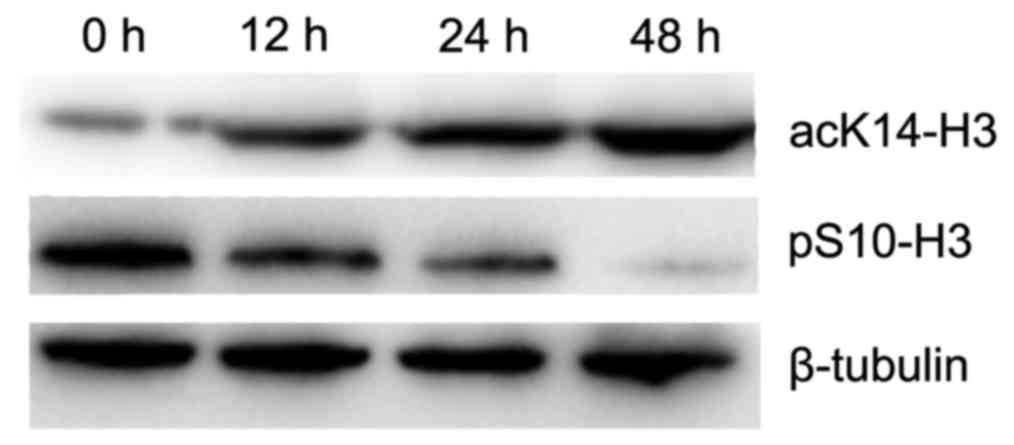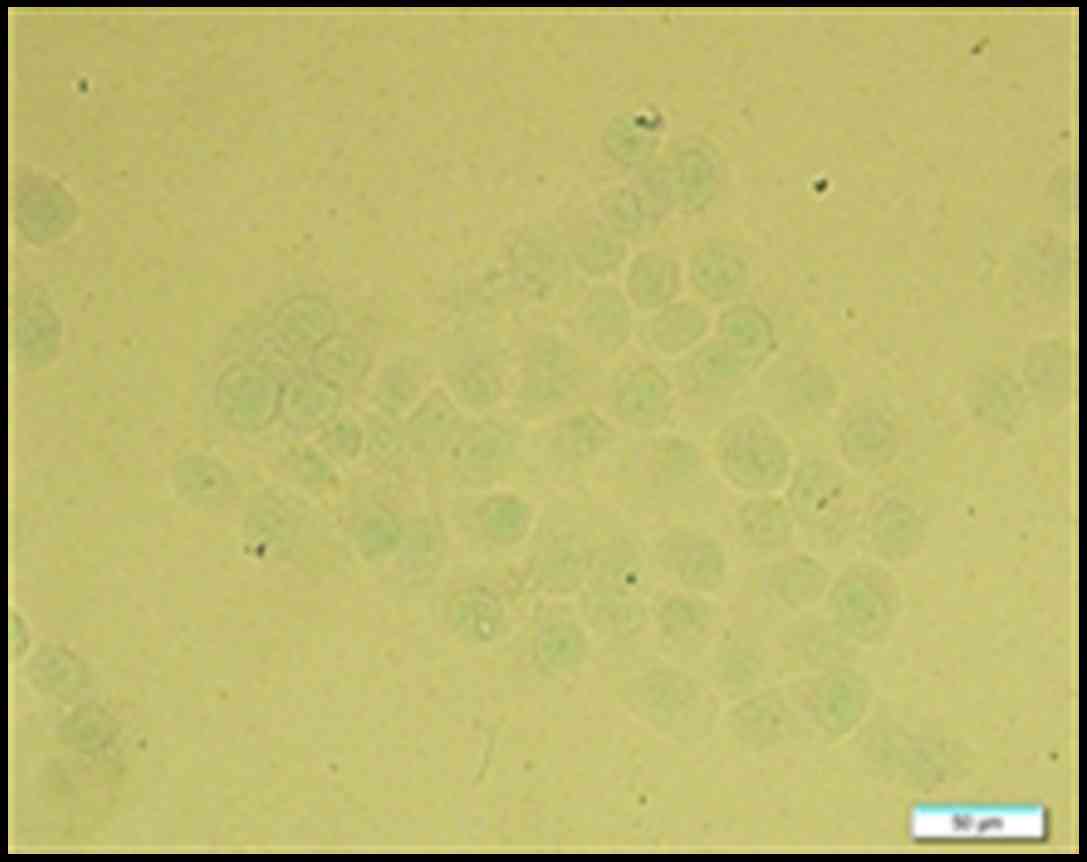|
1
|
Proietto M, Bianchi MM, Ballario P and
Brenna A: Epigenetic and posttranslational modifications in light
signal transduction and the circadian clock in Neurospora
crassa. Int J Mol Sci. 16:15347–15383. 2015. View Article : Google Scholar : PubMed/NCBI
|
|
2
|
Banerjee T and Chakravarti D: A peek into
the complex realm of histone phosphorylation. Mol Cell Biol.
31:4858–4873. 2011. View Article : Google Scholar : PubMed/NCBI
|
|
3
|
Seet BT, Dikic I, Zhou MM and Pawson T:
Reading protein modifications with interaction domains. Nat Rev Mol
Cell Biol. 7:473–483. 2006. View
Article : Google Scholar : PubMed/NCBI
|
|
4
|
Edmunds JW and Mahadevan LC: MAP kinases
as structural adaptors and enzymatic activators in transcription
complexes. J Cell Sci. 117:3715–3723. 2004. View Article : Google Scholar : PubMed/NCBI
|
|
5
|
Izzo A and Schneider R: Chatting histone
modifications in mammals. Brief Funct Genomics. 9:429–443. 2010.
View Article : Google Scholar : PubMed/NCBI
|
|
6
|
Brazil DP and Hemmings BA: Ten years of
protein kinase B signalling: A hard Akt to follow. Trends Biochem
Sci. 26:657–664. 2001. View Article : Google Scholar : PubMed/NCBI
|
|
7
|
Tokunaga E, Oki E, Egashira A, Sadanaga N,
Morita M, Kakeji Y and Maehara Y: Deregulation of the Akt pathway
in human cancer. Curr Cancer Drug Targets. 8:27–36. 2008.
View Article : Google Scholar : PubMed/NCBI
|
|
8
|
Varrault A, Ciani E, Apiou F, Bilanges B,
Hoffmann A, Pantaloni C, Bockaert J, Spengler D and Journot L:
hZAC encodes a zinc finger protein with antiproliferative
properties and maps to a chromosomal region frequently lost in
cancer. Proc Natl Acad Sci USA. 95:8835–8840. 1998. View Article : Google Scholar : PubMed/NCBI
|
|
9
|
Chen J and Li Q: Use of histone
deacetylase inhibitors to examine the roles of bromodomain and
histone acetylation in p300-dependent gene expression. Methods Mol
Biol. 977:353–357. 2013. View Article : Google Scholar : PubMed/NCBI
|
|
10
|
Chen Lf, Fischle W, Verdin E and Greene
WC: Duration of nuclear NF-kappaB action regulated by reversible
acetylation. Science. 293:1653–1657. 2001. View Article : Google Scholar : PubMed/NCBI
|
|
11
|
Zhang X, Ouyang S, Kong X, Liang Z, Lu J,
Zhu K, Zhao D, Zheng M, Jiang H, Liu X, et al: Catalytic mechanism
of histone acetyltransferase p300: From the proton transfer to
acetylation reaction. J Phys Chem B. 118:2009–2019. 2014.PubMed/NCBI
|
|
12
|
Li Z, Ding Y, Zhu Y, Yin M, Le X, Wang L,
Yang Y and Zhang Q: Both gene deletion and promoter
hyper-methylation contribute to the down-regulation of ZAC/PLAGL1
gene in gastric adenocarcinomas: A case control study. Clin Res
Hepatol Gastroenterol. 38:744–750. 2014. View Article : Google Scholar : PubMed/NCBI
|
|
13
|
Florio T: Molecular mechanisms of the
antiproliferative activity of somatostatin receptors (SSTRs) in
neuroendocrine tumors. Front Biosci. 13:822–840. 2008. View Article : Google Scholar : PubMed/NCBI
|
|
14
|
Gatto F and Hofland LJ: The role of
somatostatin and dopamine D2 receptors in endocrine
tumors. Endocr Relat Cancer. 18:R233–R251. 2011. View Article : Google Scholar : PubMed/NCBI
|
|
15
|
Zhang GZDY, Liu J, Le XP and Zhang QX:
Correlation of ZAC with somatostatin and its receptor expression in
gastric cancer tissues. Acta Anat Sinica. 39:703–707. 2008.
|
|
16
|
Dai W, Ding Y and Zhang QX: Role of ZAC
gene in the pathway of octreotide inhibiting proliferation of
gastric cancer cells in vitro. Acta Anat Sinica. 44:492–497.
2013.
|
|
17
|
Simboeck E, Sawicka A, Zupkovitz G, Senese
S, Winter S, Dequiedt F, Ogris E, Di Croce L, Chiocca S and Seiser
C: A phosphorylation switch regulates the transcriptional
activation of cell cycle regulator p21 by histone deacetylase
inhibitors. J Biol Chem. 285:41062–41073. 2010. View Article : Google Scholar : PubMed/NCBI
|
|
18
|
Winter S, Simboeck E, Fischle W, Zupkovitz
G, Dohnal I, Mechtler K, Ammerer G and Seiser C: 14-3-3 proteins
recognize a histone code at histone H3 and are required for
transcriptional activation. EMBO J. 27:88–99. 2008. View Article : Google Scholar : PubMed/NCBI
|
|
19
|
Sawicka A and Seiser C: Histone H3
phosphorylation - a versatile chromatin modification for different
occasions. Biochimie. 94:2193–2201. 2012. View Article : Google Scholar : PubMed/NCBI
|
|
20
|
Cheung P, Tanner KG, Cheung WL,
Sassone-Corsi P, Denu JM and Allis CD: Synergistic coupling of
histone H3 phosphorylation and acetylation in response to epidermal
growth factor stimulation. Mol Cell. 5:905–915. 2000. View Article : Google Scholar : PubMed/NCBI
|
|
21
|
Clements A, Poux AN, Lo WS, Pillus L,
Berger SL and Marmorstein R: Structural basis for histone and
phosphohistone binding by the GCN5 histone acetyltransferase. Mol
Cell. 12:461–473. 2003. View Article : Google Scholar : PubMed/NCBI
|
|
22
|
Lo WS, Trievel RC, Rojas JR, Duggan L, Hsu
JY, Allis CD, Marmorstein R and Berger SL: Phosphorylation of
serine 10 in histone H3 is functionally linked in vitro and in vivo
to Gcn5-mediated acetylation at lysine 14. Mol Cell. 5:917–926.
2000. View Article : Google Scholar : PubMed/NCBI
|
|
23
|
Gao S, Yu BP, Li Y, Dong WG and Luo HS:
Antiproliferative effect of octreotide on gastric cancer cells
mediated by inhibition of Akt/PKB and telomerase. World J
Gastroenterol. 9:2362–2365. 2003. View Article : Google Scholar : PubMed/NCBI
|
|
24
|
Theodoropoulou M, Zhang J, Laupheimer S,
Paez-Pereda M, Erneux C, Florio T, Pagotto U and Stalla GK:
Octreotide, a somatostatin analogue, mediates its antiproliferative
action in pituitary tumor cells by altering phosphatidylinositol
3-kinase signaling and inducing Zac1 expression. Cancer Res.
66:1576–1582. 2006. View Article : Google Scholar : PubMed/NCBI
|
|
25
|
Hoffmann A, Barz T and Spengler D:
Multitasking C2H2 zinc fingers link Zac DNA
binding to coordinated regulation of p300-histone acetyltransferase
activity. Mol Cell Biol. 26:5544–5557. 2006. View Article : Google Scholar : PubMed/NCBI
|
|
26
|
Theodoropoulou M, Stalla GK and Spengler
D: ZAC1 target genes and pituitary tumorigenesis. Mol Cell
Endocrinol. 326:60–65. 2010. View Article : Google Scholar : PubMed/NCBI
|
|
27
|
Arora A, Gera S, Maheshwari T, Raghav D,
Alam MJ, Singh RK and Agarwal SM: The dynamics of stress p53-Mdm2
network regulated by p300 and HDAC1. PLoS One. 8:e527362013.
View Article : Google Scholar : PubMed/NCBI
|
|
28
|
Wang F, Marshall CB and Ikura M:
Transcriptional/epigenetic regulator CBP/p300 in tumorigenesis:
Structural and functional versatility in target recognition. Cell
Mol Life Sci. 70:3989–4008. 2013. View Article : Google Scholar : PubMed/NCBI
|
|
29
|
Soutoglou E, Viollet B, Vaxillaire M,
Yaniv M, Pontoglio M and Talianidis I: Transcription
factor-dependent regulation of CBP and P/CAF histone
acetyltransferase activity. EMBO J. 20:1984–1992. 2001. View Article : Google Scholar : PubMed/NCBI
|
|
30
|
Dyson MH, Thomson S and Mahadevan LC: Heat
shock, histone H3 phosphorylation and the cell cycle. Cell Cycle.
4:13–17. 2005. View Article : Google Scholar : PubMed/NCBI
|
|
31
|
Ray PD, Huang BW and Tsuji Y: Coordinated
regulation of Nrf2 and histone H3 serine 10 phosphorylation in
arsenite-activated transcription of the human heme oxygenase-1
gene. Biochim Biophys Acta. 1849:1277–1288. 2015. View Article : Google Scholar : PubMed/NCBI
|
|
32
|
Lieberman-Aiden E, van Berkum NL, Williams
L, Imakaev M, Ragoczy T, Telling A, Amit I, Lajoie BR, Sabo PJ,
Dorschner MO, et al: Comprehensive mapping of long-range
interactions reveals folding principles of the human genome.
Science. 326:289–293. 2009. View Article : Google Scholar : PubMed/NCBI
|
|
33
|
Andrulis ED, Neiman AM, Zappulla DC and
Sternglanz R: Perinuclear localization of chromatin facilitates
transcriptional silencing. Nature. 394:592–595. 1998. View Article : Google Scholar : PubMed/NCBI
|
|
34
|
Berman BP, Weisenberger DJ, Aman JF,
Hinoue T, Ramjan Z, Liu Y, Noushmehr H, Lange CP, van Dijk CM,
Tollenaar RA, et al: Regions of focal DNA hypermethylation and
long-range hypomethylation in colorectal cancer coincide with
nuclear lamina-associated domains. Nat Genet. 44:40–46. 2011.
View Article : Google Scholar : PubMed/NCBI
|
|
35
|
Hansen KD, Timp W, Bravo HC, Sabunciyan S,
Langmead B, McDonald OG, Wen B, Wu H, Liu Y, Diep D, et al:
Increased methylation variation in epigenetic domains across cancer
types. Nat Genet. 43:768–775. 2011. View
Article : Google Scholar : PubMed/NCBI
|
|
36
|
Paska AV and Hudler P: Aberrant
methylation patterns in cancer: A clinical view. Biochem Med.
25:161–176. 2015. View Article : Google Scholar
|
|
37
|
Berger SL: The complex language of
chromatin regulation during transcription. Nature. 447:407–412.
2007. View Article : Google Scholar : PubMed/NCBI
|
|
38
|
Oliver SS and Denu JM: Dynamic interplay
between histone H3 modifications and protein interpreters: Emerging
evidence for a ‘histone language’. ChemBioChem. 12:299–307. 2011.
View Article : Google Scholar : PubMed/NCBI
|
|
39
|
Winter S, Fischle W and Seiser C:
Modulation of 14-3-3 interaction with phosphorylated histone H3 by
combinatorial modification patterns. Cell Cycle. 7:1336–1342. 2008.
View Article : Google Scholar : PubMed/NCBI
|
|
40
|
Ferjoux G, Bousquet C, Cordelier P, Benali
N, Lopez F, Rochaix P, Buscail L and Susini C: Signal transduction
of somatostatin receptors negatively controlling cell
proliferation. J Physiol Paris. 94:205–210. 2000. View Article : Google Scholar : PubMed/NCBI
|

























